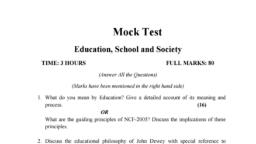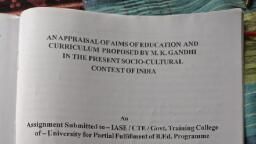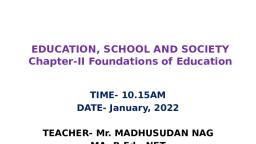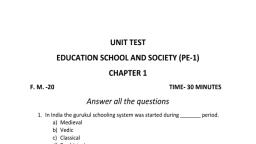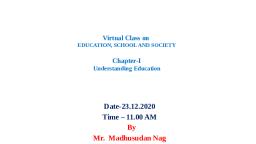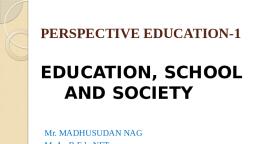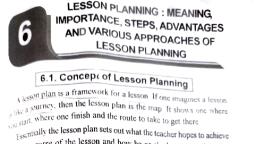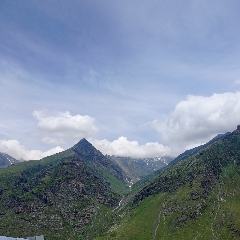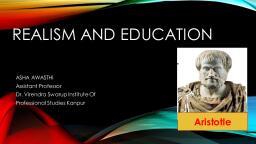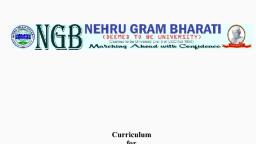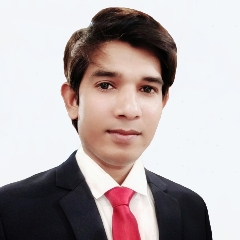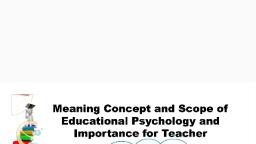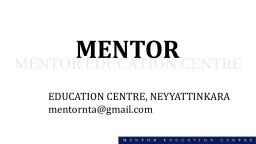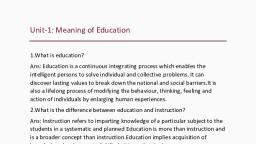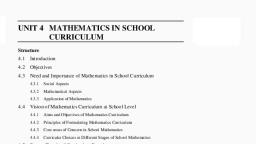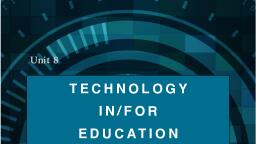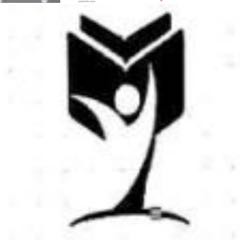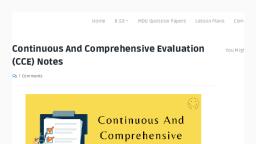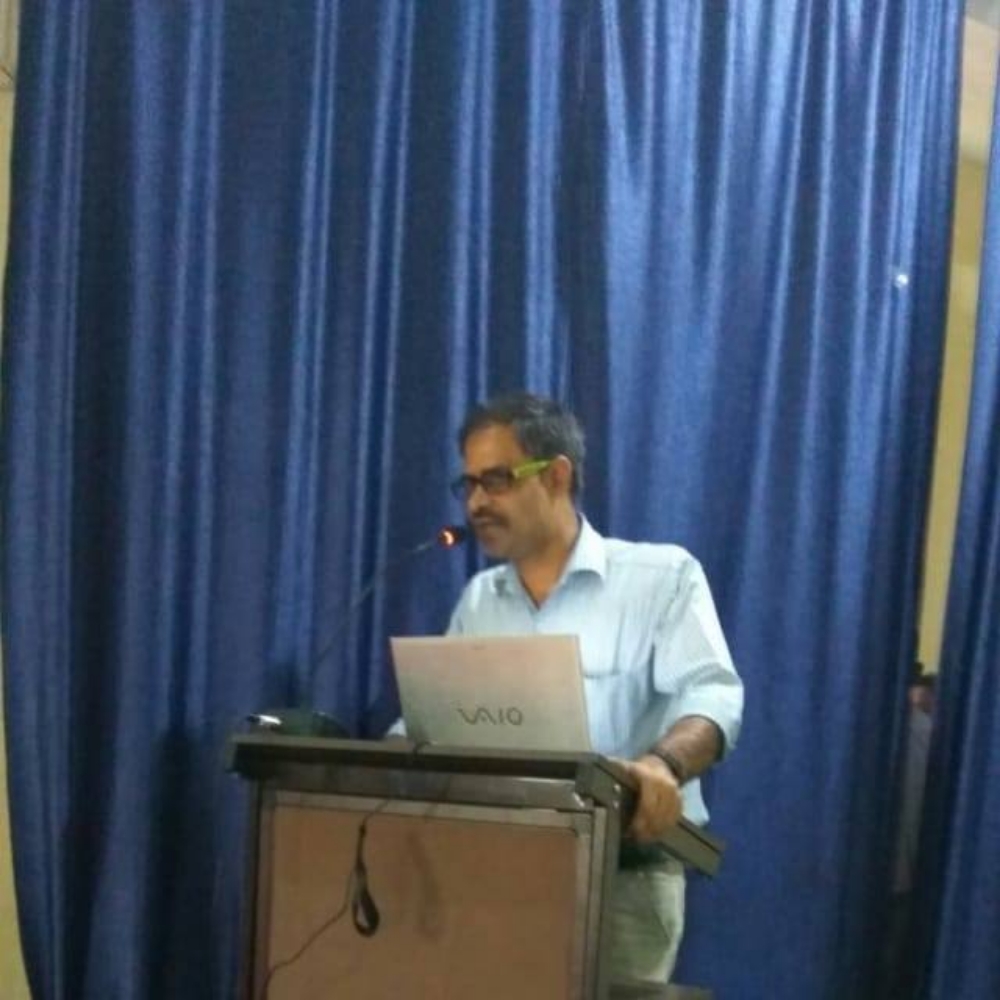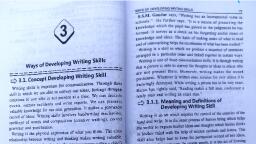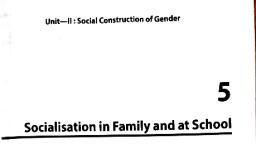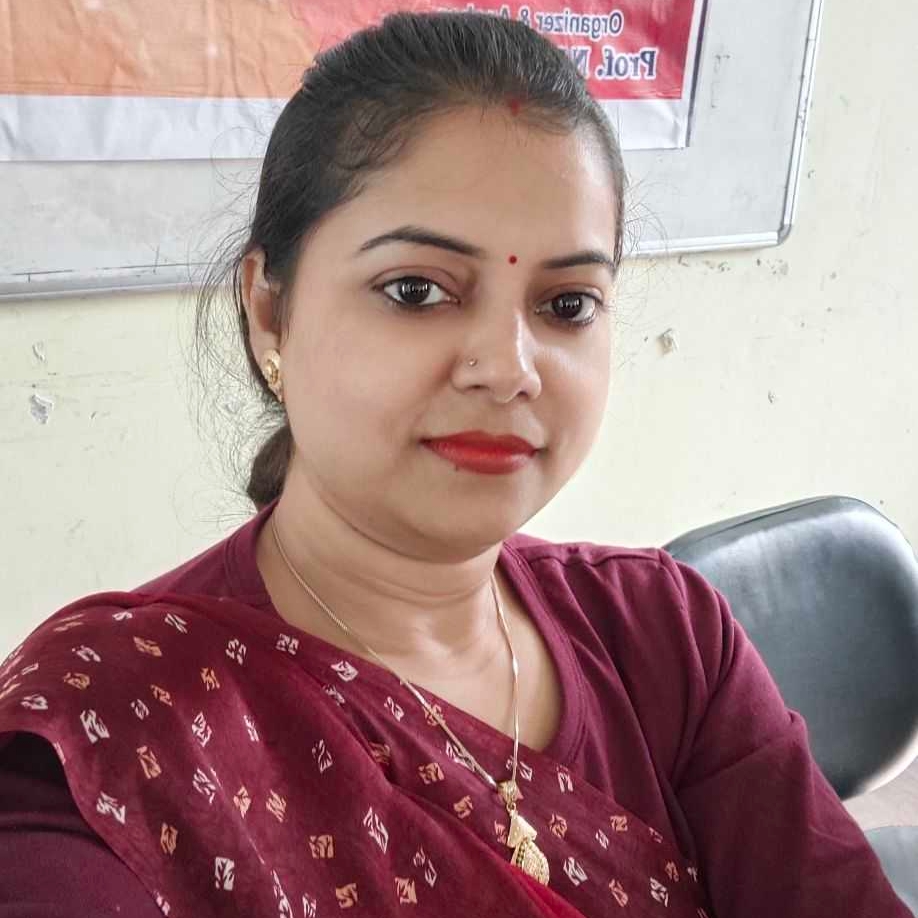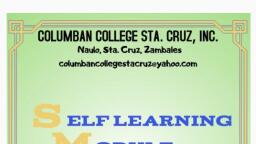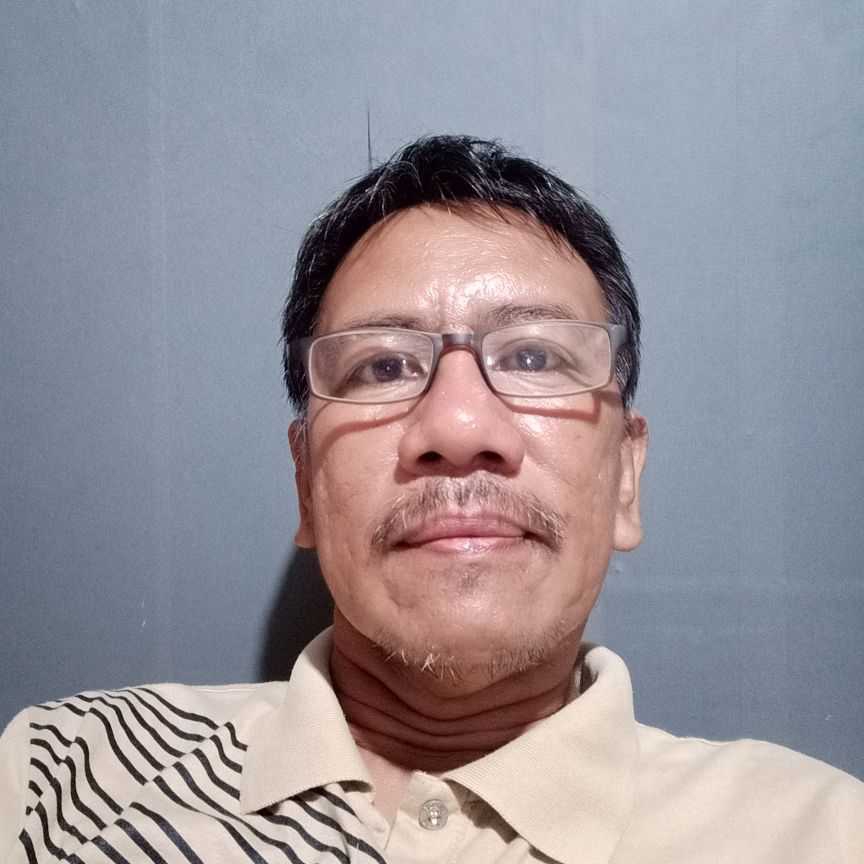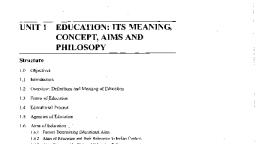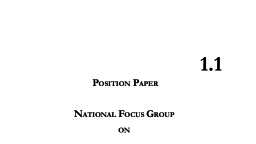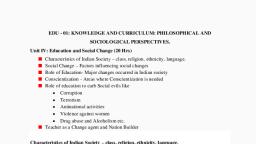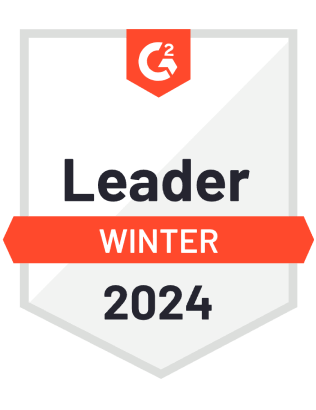Page 1 :
UNDERSTANDING EDUCATION, , SO ES a, Derivation of the Term ‘Education’, , ; The vo education is derived from the Latin word ‘Educare’ which means to “bring, up’, ‘to nourish’, ‘to protect’. That means, the child is just like a small plant and the teacher is, just like a gardener. It is the task of the teacher to provide suitable environment and protection, for the development of the small child as is being done by the gardener for the plant. Similarly,, the word education is also derived from the Latin word ‘Educere’ which means “to draw out’, or ‘to lead’. That means, the child is just like a seed, and a big tree with flowers and fruits is, waiting for us inside the small seed. It is the task of the gardener to draw out that big tree from, the small seed. This manifestation is only possible, if suitable environment will be provided., Similarly, the word Education is also derived from another Latin word ‘Educatum* which means, the act of training., , Again, a number of synonyms of the word Education are available. The word pedagogy, is sometimes used for education. It means ‘paides’ — ‘boy’ + ‘a-gein’ — ‘to lead’ i.e to lead the, boy. Similarly, the most common Indian word ‘Shiksha’ is derived from the Sanskrit verbal root, ‘Shas’ which means “to control’, ‘to teach’. Another word ‘Vidya’ is derived from the Sanskrit, , verbal root ‘Vid’ which means “to know’., , Meaning of Education, Education has two meanings i.e. Narrower meaning of education and Broader meaning, , of education., Narrower Meaning of Education : ', Some people consider the experience or knowledge which we acquire frony school,, college and university as education. Education is only possible by the interaction between, : process and ruled by certain principles like enrollment, attendance,, , teacher and students. It is @ f I men, course coverage, working days, time schedule, curricular and co-curricular vars Toe., and certification. Those students who do not qualify in the examination are gi, , certificate to the effect that they have completed education to a certain level. For qualifying in, an examination, they must have nl, they will be eligible to engage themselves, , minimum levels of learning competencies. Then oaly,, in different Government and Non-Government, jobs.
Page 2 :
2 Education, School and Society, , , , ——————, , , , , , , Those people who consider school experience as educative, treat the school as a temple of If the c, learning and the teacher as the bearer of the key of the temple. To them, other than the teacher, not acknowle, it is not possible to enter the temple without the knowledge of the teacher. The Narrower J pe limited fo, meaning of education has some positive implications too the learned |, 1. One planned educational process can only be possible through formal agencies like schools, J believe othe, colleges and universities. Then, 2. There are different innovative strategies to make teaching-learning process joyful, child- If the child, friendly and interactive. Teachers are being trained in this respect. Objectives are being towards his, spelt out. Competencies for each class and each subject are being decided prior to is not acoey, teaching. But other than the teacher and educational institutions what learners experience practice., or acquire are not systematic. It is more or less incidental So it, 3. Moreover, in case of classroom transaction, interaction among learners facilitates their there is no, social development and provides environment for self-expression and self-actualization. progressiv, Some educationists opine that only classroom processes will not solve the purpose. developm, Complete education is not possible only from the knowledge acquired from schools and colleges. Eastern ¥, For example, some experiences that we experience at home are not available elsewhere. Rig, Similarly, sometimes a small child may make the intellectuals astonished by virtue of his innovative Ka, ideas. So rote memory may help the learners to secure good marks in the examination but may She, not help completely for development of a balanced personality. So it is stipulated in the National Sw, Curriculum Framework, 2005 to link education with school experience outside the school existing i, ambience. So school education without real life experience has no meaning by itself. Ra, Broader Meaning of Education : truth whi, Education has many connotations. Its scope is very wide. It is as old as man himself. It" but of fe, has its beginning prior to the creation of the Universe. Likewise, it also starts prior to conception Sr, of human baby in the mother’s womb and ends in the grave. For example, it is stipulated in M, Mahabharat that Abhimanyu learned the techniques of war from his mother’s womb while and man, , , , , Arjuna explained it to his wife. Similarly, in the opinion of doctors the physical and m, condition of mother affect the child’s physical and mental health in the mother’s womb., the dissatisfaction of the mother has negative impact on the child even after his birth., children get irritated in minor issues. So every experience is said to be educative. Event, biting of a mosquito is also one kind of education as stated by Lodge. So the persons, teaches in the classroom is not the only teacher but father, mother, brother and sister, I, members, friends and relatives can also be regarded as teachers. So education is a prc, , and even the old man who is waiting for death also learns. That’s why, Whitehead is, opinion that “Education has only one topic, that is life”. Ithas the following positive mg
Page 3 :
‘Se, , Understanding Education 3, , , , , , , , , , , , , , , , , , , , , If the child accepts only the person who is teaching inside the class as teacher and does, not acknowledge the advice and guidance of others, then the scope of learning environment will, be limited for him. Sometimes, it so happens that the child hesitates to accept the statements of, the learned father, rather he believes in the wrong statement of the teacher. But he has to, believe others, who have capabilities to contribute towards his knowledge., , The negative implications of the broader meaning of education also need to be pondered., If the child accepts everyone as teacher with an expectation that he / she will contribute, towards his / her. educational endeavour then sometimes it may lead to negative learning which, is not accepted by the society. Again it may be difficult in future to deter the child from the, practice., , So in conclusion, it can be said that there is no term like Sushiksha or Kushiksha and, there is no narrower and broader meaning of education. The experience which helps in the, progressive development of an individual is education and the teacher is he who can mould the, development of the child in a positive direction., , Eastern Viewpoint :, , Rig Veda : “Education is something which makes a man self-reliant and selfless”., , Kautilya : “Education means training for the country and love for the nation”., , Shankaracharya : “Education is the realization of the self”., , Swami Vivekananda : “Education is the manifestation of divine perfection, already, , existing in man”., Rabindranath Tagore : “Education means enabling the mind to find out that ultimate, , truth which emancipates us from the bondage of the dust and gives us the wealth, not of things, , but of inner light, not of power but of love, making this truth its own and giving expression to it”., draw out that is in itself”., , Sri Aurobindo : “Helping the growing soul to, Mahatma Gandhi : “By education I mean an all-round drawing out of the best in child, and man — body, mind and spirit”., , Dr. A.P.J. Abdul Kalam : “Educat, to change the world”., Western Viewpoint =, , Plato : “Education is th, develops in the body and in the soul of, , capable of”., Aristotle : “Education is the creatio!, , faculty especially his mind, so that he may o, goodness and beauty of which perfect happiness essentially con, , ion is the most powerful weapon which you can use, , e capacity to féel pleasure and pain at the right moment. It, the pupil all the beauty and all the perfection which he is, , sound body. It develops man’s, , n ofa sound mind ina, reme truth,, , be able to enjoy the contemplation of sup’, sists”.
Page 4 :
Education, School and Society, , , , , , , , , , , , , , , , , , , , , , , , , , monious and progressive development of man’s, , Pestalozzi : “Education is natural, har, innate powers”., , EW.A,. Froebel : “Education is unfoldment 24 ., the process which the child makes internal, external”., , hat is already enfolded in the germ. It is, , Spenser : “Education is complete living”., ate process in which one personality acts, , x ion is a conscious and deliber a. ss, f that other by the communication and, , upon another in order to modify the development 0}, manipulation of knowledge”., , educa, opini¢, learn¢, impo, Philo, respec, them, harn, curr, , t of the individuality of the child so, , TP. Nunn : “Education is the complete developmen ), rding to the best of his capacity”., , that he can make an original contribution to human life acco, , “Education is a process of development from infancy to maturity, the, , T. Raymont : 7 : ; y, process by which he adopts himself gradually in various ways of his physical, social and spiritual, , environment”., Ross : “The aim of the education is the development of valuable personality and spiri, individuality”., John Dewey : “Education is the process of living through a continuous reconstruction of, experiences. It is the development of all those capacities in the individual which will enable him, to control his environment and fulfill his possibilities”., , Redden : “Education is the deliberate and systematic influence, exerted by the mature, person upon the immature through instruction, discipline and harmonious development of physical,, intellectual, aesthetic, social and spiritual powers of the human being, according to individual, and social needs and directed towards the union of the educand with his creator as the final, end”,, Process, , Education is as old as man himself. Men may come and men may go, but education goe, on for ever. It is a process. It makes a man, a ‘man’. Without education man is treated as, beast. Man is the highest creation of God. His intellect, power of reasoning differentiate, from other animals. Education provides direction for a better life. Itis a a ing process. ,, starts from mother’s womb and ends in the grave. Human being learns in cued iods of, development. Nature has created many things for us. It has its own laws. Education ‘, human being to know the laws of nature and utilize the natural AE for their, , development with a view to leading a better li i, Sedan g a better life. According to Sir John Adams, e
Page 5 :
nan’s, , . Itis, , ‘acts, , | and, , Id so, ity”., , the, , ‘itual, , itual, , on of, > him, , ature, sical,, idual, final, , goes, | asa, > him, oss. It, ds of, s the, , own, nisa, , ws Understanding Education 5, , Teacher Student, , Education, , There are two poles in the educative process. One is educator or teacher and another is, educand or student. One provides knowledge, another receives it. But John Dewey, is of the, opinion that education is a triangular process. To him, the teacher imparts education to the, learner. But the content of education or the curriculum or the environment is also equally, important. So, it is also one of the poles of education. Each society has its own philosophy., Philosophy determines the way of life and skills required for social adjustment. It is the, responsibility of the teacher to teach social values to the learners to enable them to adjust, themselves in the environment. Understanding of social values facilitates for leading a, harmonious, peaceful and pleasant life. That’s why environment or learning experience or, curriculum is considered as one of the poles in the educative process., , Teacher Student, , Learning, Experience/Environment, , But modern educationists are of the opinion that since we receive information, knowledge, from the teacher, it is obvious to consider him as one of the poles in teaching-lesraing process., Similarly, we receive knowledge, information and experience from radio, television, newspapers, etc, So those are also treated as different poles of the teaching-learning process. Thus education, , is considered as a multipolar process., , Newspaper., , Teacher Education | parents, , Playground Friends

